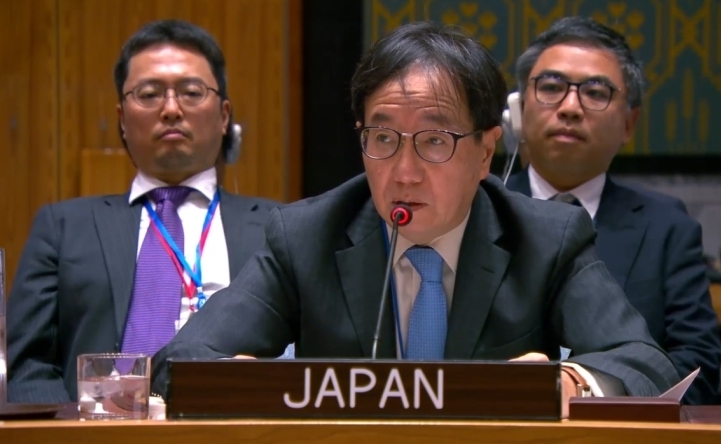Statement by H.E. Ambassador YAMAZAKI Kazuyuki, Permanent Representative of Japan to the United Nations, at the United Nations Security Council Briefing on Protection of Civilians in Armed Conflict (Resolution 2730)
2024/11/26

(As delivered)
Thank you, Mr. President.
I thank Director Doughten, USG Michaud, and Ms. Stoddard for their sobering briefings.
Japan remains deeply concerned about the escalating risks faced by humanitarian workers as 2024 has tragically become the deadliest year on record for those dedicated to providing life-saving assistance.
The ongoing war in Gaza has significantly contributed to this grim milestone, with over 320 humanitarian workers losing their lives since October 7, 2023. Many of them perished while delivering vital assistance, with the majority being staff members of UNRWA.
The risks faced by aid workers extend far beyond Gaza. Reports of severe violence, kidnappings, injuries, harassment, and arbitrary detentions are alarmingly high in countries such as Afghanistan, the Democratic Republic of the Congo, South Sudan, Sudan, Ukraine, Yemen, and others.
In these dire circumstances, Japan welcomes the Secretary-General’s recommendations on preventing and responding to violence and threats against humanitarian workers, strengthening accountability, and improving protection for humanitarian personnel and assets, as requested by Security Council Resolution 2730, led by Switzerland, and co-sponsored by Japan.
Mr. President,
Japan would like to highlight five points in response to these recommendations.
First, international humanitarian law is a fundamental obligation that must be upheld. Japan strongly urges all parties to comply with international law, including IHL.
We also underscore the important work of the International Humanitarian Fact-Finding Commission and advocate for its activities to be strengthened.
Second, it is critical to strengthen measures to ensure accountability for violations of IHL. Persons allegedly responsible for serious violations of IHL must be held accountable, and justice under the rule of law must be done. From this perspective, Japan remains committed to supporting the International Criminal Court.
Third, Japan also attaches great importance to the psychosocial well-being of humanitarian personnel and their family members, particularly those operating in high-risk environments. These challenges, though not always visible, are significant.
Drawing from its own disaster response experience, Japan recognizes the importance of mental health support for both victims and aid providers. To this end, Japan has contributed financial resources to the UNDSS project “Capacity Building in Crisis Psychosocial Support,” which has been enhancing the capacity of UN mental health experts by updating training programs since January.
Fourth, Japan has long emphasized the need for safe and smooth peace operation transitions during the drawdowns of peace missions, particularly with regard to the safety and security of humanitarian personnel. Their drawdowns, whether due to political circumstances to exit the country or to successful completions, often increase risks for aid workers.
The Security Council must plan transitions carefully and early, leveraging the expertise of UN peacekeeping missions, special political missions, OCHA, UNDSS, the Peacebuilding Commission, UNCTs, and other relevant bodies to mitigate security risks and ensure continuity of assistance.
Finally, it is essential to sustain the momentum generated by the adoption of Resolution 2730. In this regard, we hope that the Declaration pursued by the Ministerial Group for the Protection of Humanitarian Personnel, initiated by Australia, with Japan participating as a member, will garner widespread support when it is subsequently adopted. Such a declaration would symbolize the international community's unity and resolve to protect humanitarian personnel.
Mr. President,
In conclusion, Japan reaffirms its unwavering commitment to protecting humanitarian workers. We call on the international community to collectively enhance measures to safeguard these vital actors, whose selfless efforts bring hope and relief to millions worldwide. Together, we must ensure that their courage and humanity are met not with violence, but with the protection and respect that they deserve.
I thank you.
